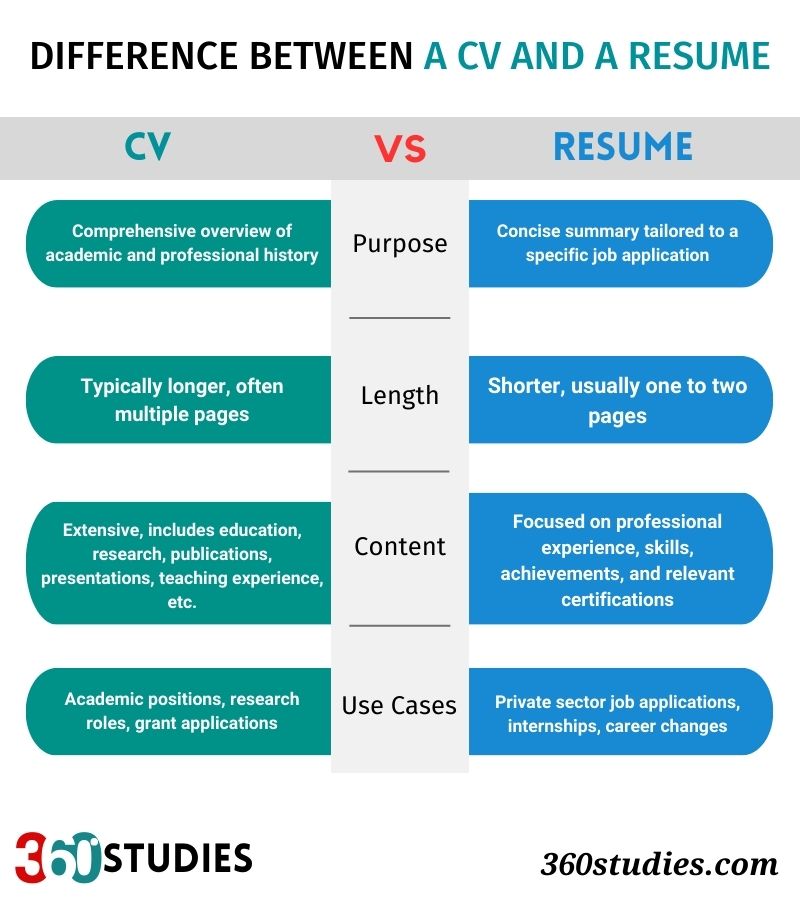Difference between CV and Resume
In today’s highly competitive job market, it is essential to understand the differences between a CV and a resume and know how to use them effectively to maximize your chances of landing your dream job. However, there is often confusion and misconceptions surrounding these terms. This article aims to provide a comprehensive overview of CVs and resumes, discussing their purposes, content, target audiences, and highlighting key differences.
1. What is a CV?
A CV, or Curriculum Vitae, is a document that provides a detailed overview of an individual’s educational and professional background. Originating from Latin, the term CV translates to “course of life,” and its original purpose was to showcase one’s academic accomplishments and qualifications.
In modern usage, a CV serves as a comprehensive summary of an individual’s qualifications, skills, and experiences, providing a more detailed account compared to a resume.
Table of Contents
- 1 1.1 Length and Content
- 2 1.2 Target Audience
- 3 2.1 Length and Content
- 4 2.2 Target Audience
- 5 3.1 Length and Structure
- 6 3.2 Content Differences
- 7 4.1 Formatting and Structure Variations
- 8 5.1 Academic and Research Positions
- 9 5.2 International Job Applications
- 10 5.3 Industry and Job-Specific Requirements
1.1 Length and Content
One of the defining characteristics of a CV is its comprehensive nature. Unlike a resume, which is usually limited to one or two pages, a CV can span multiple pages, allowing for extensive detail on various aspects of an individual’s career.
Common sections included in a CV typically comprise education, work history, research experience, publications, presentations, awards, and professional affiliations. It’s crucial to customize the content of the CV based on the job application, emphasizing relevant experiences and skills.
1.2 Target Audience
CVs are often required or preferred by academia, research institutions, and certain industries that value a comprehensive overview of an individual’s background. For example, professors, researchers, and scientists are more likely to ask for CVs when assessing potential candidates.
In some regions, such as Europe and Australia, CVs are more commonly used than resumes, especially for job applications. Additionally, CVs are generally preferred when applying for positions that require extensive experience, specialized knowledge, or advanced degrees.
2. What is a Resume?
While similar to a CV, a resume is a more concise document that focuses on an individual’s most relevant skills, work experience, and qualifications. Resumes are commonly used in the business world, particularly for job applications in corporate environments.
2.1 Length and Content
Unlike CVs, resumes are usually just one or two pages, so you need to present your qualifications and experience briefly. Key resume sections include a summary or objective statement, work history, skills, education, and any notable achievements or certifications.
To make your resume stand out, it is crucial to tailor the content to the specific job for which you are applying. Highlighting skills and experiences that directly relate to the position will capture the attention of potential employers.
2.2 Target Audience
Resumes are the preferred document for many employers in industries such as business, finance, marketing, and technology. They tend to be favoured in regions like North America.
In situations where employers receive a high volume of applications or prefer a quick overview of a candidate’s qualifications, resumes are the preferred document. Resumes offer a concise snapshot of an individual’s relevant skills and experience, making it easier for employers to assess their suitability for a job.
3. Key Differences Between CV and Resume
Understanding the key differences between a CV and a resume is crucial for tailoring your application to each specific situation.
3.1 Length and Structure
CVs are extensive by nature, accommodating comprehensive information about your career. There’s no strict length limit for a CV, but it can often extend beyond several pages due to its thoroughness.
In contrast, a resume is concise and focused. It strictly adheres to one to two pages, ensuring that it presents a snapshot of your qualifications, achievements, and skills without overwhelming the reader.
For example, a CV may include a detailed list of research publications, while a resume would summarize the most significant research contributions. This distinction demonstrates the contrasting levels of detail provided by each document.
3.2 Content Differences
When it comes to content, CVs and resumes diverge significantly:
3.2.1 Content of a CV:
- Education: Detailed information about your academic background, including degrees, institutions, dates, and any special honours.
- Research and Publications: A comprehensive list of your research work, publications, and any related achievements.
- Presentations and Conferences: Details about conferences you’ve attended, presented at, or organized.
- Teaching Experience: Information about your teaching roles, courses taught, and any teaching-related accomplishments.
3.2.2 Content of a Resume:
- Professional Experience: A concise overview of your work history, emphasizing relevant positions, job responsibilities, and accomplishments.
- Skills: A section highlighting your key skills and abilities relevant to the job you’re applying for.
- Achievements and Awards: Notable accomplishments, awards, or recognitions you’ve received.
- Certifications and Licenses: Any professional certifications or licenses relevant to the job.
4. Focus on Academic vs. Professional Experience
CVs often prioritize academic achievements and research experience, making them more suitable for academia and research-related positions. In contrast, resumes highlight an individual’s work experience, focusing on skills and accomplishments that are relevant to a specific job in a professional setting.
Determining whether to use a CV or a resume depends on the job requirements and the industry’s norms. While a CV may be appropriate for a university faculty position, a resume might be the better choice for a sales or marketing role in a corporate environment.
4.1 Formatting and Structure Variations
CVs generally allow for more flexibility and organization options due to their extensive content. A CV can include sections like research methodology and academic conferences attended, showcasing an individual’s expertise and professional growth.
Resumes, on the other hand, follow a more standardized format. Using concise and scannable sections allows potential employers to assess a candidate’s qualifications and relevant skills quickly.

5. When to Use a CV or a Resume?
Choosing the appropriate document, whether a CV or a resume, depends on various factors including the industry, job requirements, and regional preferences.
5.1 Academic and Research Positions
Academic and research positions, such as professorships, post-doctoral roles, or research fellowships, typically require a CV. These positions often value an individual’s comprehensive academic background, including research contributions, publications, and teaching experience.
In these contexts, a CV provides a holistic view of an individual’s qualifications and accomplishments, offering a comprehensive assessment of their suitability for the role.
5.2 International Job Applications
When applying for jobs internationally, it is crucial to understand regional preferences regarding CVs and resumes. Many countries, particularly in Europe, Asia, and Africa, generally prefer CVs over resumes.
For international job applications, it is advisable to research the specific expectations and norms of the country or region to increase the chances of a successful application.
5.3 Industry and Job-Specific Requirements
Certain industries and job roles have established norms regarding the document preferred for applications. For instance, roles in creative fields, such as graphic design or fashion, may prioritize visual resumes that showcase an individual’s creativity and aesthetic sensibilities.
However, it is essential to note that even within industries, preferences might vary. Consulting and finance, for example, typically require resumes, but some firms may request a CV to assess an applicant’s depth of knowledge in the field.
6 Common Questions and FAQs
1: What is the main difference between a CV and a resume?
Ans.: The main difference lies in their length, content, and purpose. CVs are comprehensive documents that provide a detailed overview of an individual’s academic and professional background. Resumes, on the other hand, are concise summaries that focus on relevant skills and work experience.
2: Which document is better to use when applying for a job?
Ans.: The choice between a CV and a resume depends on factors such as job requirements, industry norms, and regional preferences. Understanding the specific expectations of the employer or institution will help determine which document to use.
3: Can I use a CV instead of a resume?
Ans.: In some cases, using a CV instead of a resume might be appropriate, but it is essential to consider the job requirements and the industry’s preferences. Tailoring your application to include the most relevant information for a specific position is crucial.
7 Conclusion
In summary, understanding the differences between a CV and a resume is vital for job seekers seeking to make a lasting impression on potential employers. It is essential to tailor the document to suit the specific job application, highlighting the most relevant skills and experiences.
By understanding the purpose and target audience of each document, selecting the appropriate one for each situation becomes more manageable. Whether it’s a CV to showcase academic achievements or a resume to emphasize professional experience, choosing the right document will maximize your chances of success in your job applications. So, take your time, craft your document thoughtfully, and make your qualifications shine through.
Tags: difference between cv and resume, difference between bio data resume and cv, difference between biodata resume and cv


